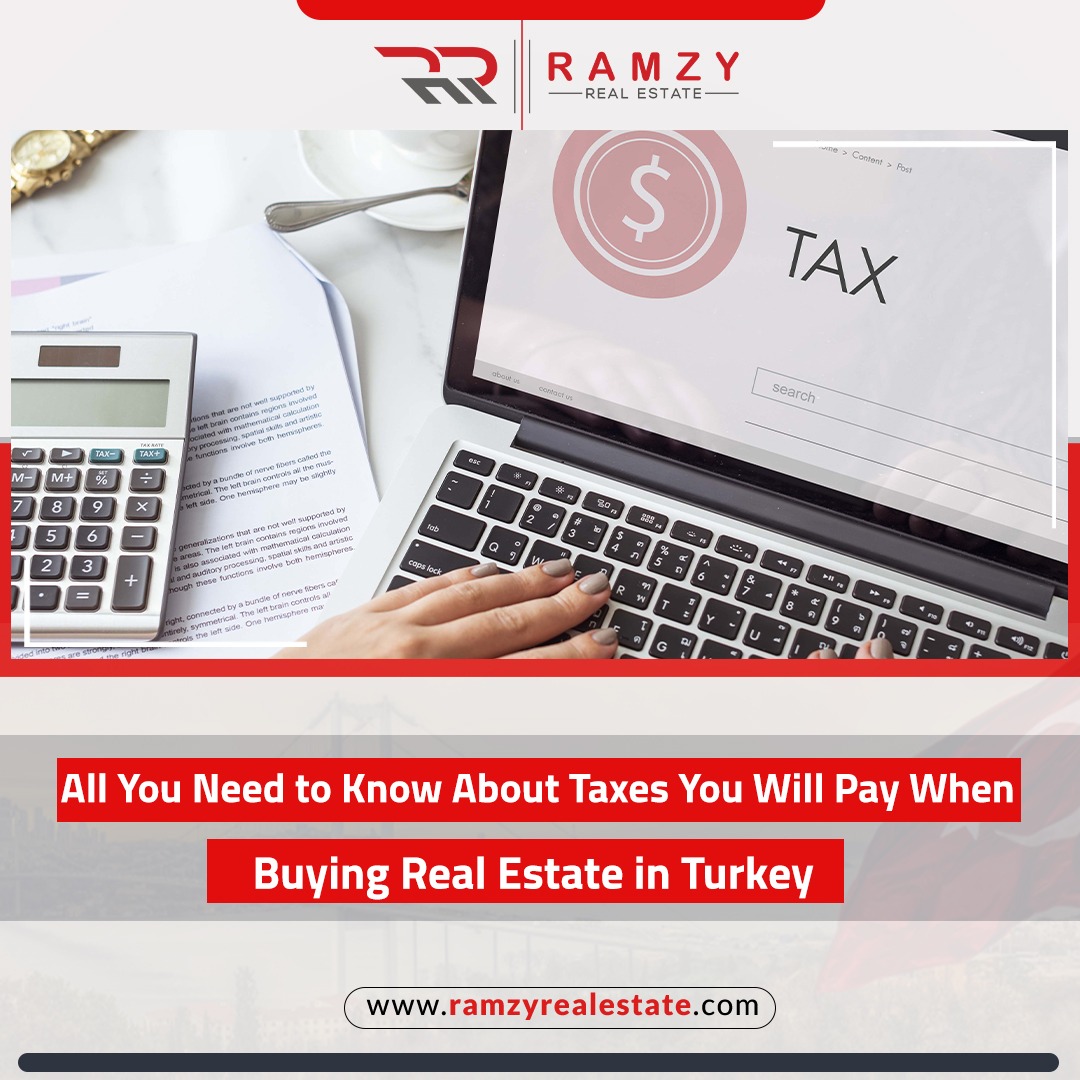All you need to know about Taxes you will pay when buying real estate in Turkey

Content Index
Taxes are one of the most important issues that investors ask about when they buy a property in Turkey, and it is one of the critical issues that anyone interested in buying a property must carefully study and pay attention to, especially if he is buying for the first time in Turkey, or even from those who have previously purchased before, and unfortunately there is a state of uncertainty among real estate consultants as they do not provide complete answers to the investor for fear that the investor will back down from buying the property, as real estate consultants never give complete information about the property tax saying it is enough for the investor to know the information about taxes of transferring the ownership of the property, known as the "Tapu" tax, without entering into details on the pretext that these details will disturb the investor and distract him, especially if the specifications of his real estate are general and do not enter into exceptional cases of the property, while some other consultants postpone the information about the investor until he completes the purchase process or they answer it when the time comes to pay it, and most companies are satisfied with defining the investor only the title deed transfer tax and value added tax “KDV”, which is estimated in most residential real estate at about 1% of the value of the real estate, and taxes are the money that buyer and seller will pay to Tax Departments - Real Estate Authority - when buying a property in Turkey or transferring its ownership from the seller to the buyer.
In fact, Taxes of real estate is very diverse, as the real estate tax is divided into two types, the first is to be paid once and the other is paid annually. In this article, we will discuss everything related to real estate taxes when buying a property or after purchasing it.
1- One-time taxes:
It is often associated with the purchase of the property and the buyer pays it only once and does not pay it again at all. This type of tax is divided into:
A. Tax of transferring Title deed:
It is a fee imposed by the state to transfer the ownership of the property from the seller's name to the new buyer, and it is the highest value among all real estate taxes and is about 4% of the total value of the property, and foreigners are equal with the Turks as they pay the same value of taxes paid by the Turks, which according to the law the value should be divided and paid equally between both the seller and the buyer, but in recent years the buyer pays it if the apartment is within a separate building or resale from a Turkish citizen, but for the construction companies, they bear half the value of the 2% tax, and the buyer pays the other 2%, and there are some construction companies that pay the full 4% to encourage the investor to buy from one of its projects.
Reconstruction projects are exempted from the 4% tax on transferring title deed ownership, and the investor does not pay it if the project is among the reconstruction projects, which are those projects that are built on land that is being re-developed, and therefore the buyer of any property falls within the urban development areas. The investor must be aware that he is exempt from paying the Tapu tax.
B. KDV Value Added Tax:
This Tax varies from one property to another and is imposed by the Tax Department, and it is usually on commercial properties and on residential buildings and projects that are being reconstructed, it is ranged about 1% or 8% and reaches 18%, and there are a number of factors determined by the state and on the basis of which the value of Real estate tax.
Factors that determine the value of added tax:
- Type of property:
Real estate in Turkey is divided into land or residential, such as villas and apartments, or commercial, such as shops, hotel apartments, or real estate established for a commercial purpose, such as home office apartments and others that are used for commercial purposes and generate a profitable return for the owner, and according to the purpose and type of the property, the property tax is determined, and the real estate tax is Commercial real estate is 18%, while residential real estate is usually 1%.
- The area of the property:
The real estate area is one of the factors that determine the value of the tax, especially in residential real estate, in light of the recent amendments approved by the Turkish government at the end of March 2022, which identified as follows:
1% if the net area of the property is less than 150 square meters.
8% if the property area is 150 square meters.
18% if the net area of the property is greater than 150 square meters, and according to the new amendments, the value-added tax will be calculated for apartments with a net area of more than 150 square meters, as 8% for 150 square meters of the net area of the apartment, and 18% for the number of meters in excess of 150 square meters, and if the property’s area is 180 square meters, the tax is calculated as follows: 8% for the first 150 meters, and 18% for the remaining 30 square meters.
- The location of the property:
The location of the property is one of the factors that determine the value-added tax, because each region has its own nature. Real estate located in economic or tourist areas is usually value-added tax 18%, and the title deed department in each municipality determines the neighborhoods to which the value of each property applies the tax, there is Florya area, which is a residential area, and the real estate tax in it is 18% even if the property area is less than 150 square meters, Therefore, only Tapu Department of each municipality determines the value of the added tax for each area.
Conditions for exemption from the 18% tax:
The state has specified some conditions by which a foreigner can be exempted from value-added tax if his property meets the conditions of the 18% tax, including:
- If the foreigner doesn’t hold any type of residence permit in Turkey, such as real estate residence or tourist or student residence or work residence in Turkey.
- The buyer is already outside Turkey during the purchase process to be exempted from value-added tax.
- He is outside Turkey for 6 consecutive months during the current or previous year.
The state requires that the buyer submit a bank transfer showing the transfer of the value of the apartment or property from a bank account from outside Turkey to the account of the seller or construction company in Turkey.
2- Taxes that are paid annually:
A- The municipality tax:
Municipalities in Turkey impose an annual fee of 0.03% of the total value of the property on real estate that located in its area, which is known as "EMLAK VERGİSİ", which are taxes that must be paid annually to the administration of the municipality, and the value is determined by the municipality in which it is located. This tax is paid there as well, it often paid every May of every year for the services provided by the municipality to the area in which the property is located.
B- Profit tax:
It is imposed on commercial real estate such as commercial shops, offices, home office apartments or hotel apartments, which generates a profitable return for its owner, and it varies according to the nature and activity of the property and is determined by the Tax Department, Profit tax is also imposed in case that the buyer sells the property before 5 years have passed from the date of the purchase in order to get profits from the sale of the property.



